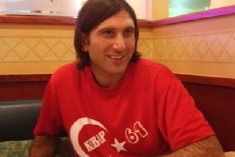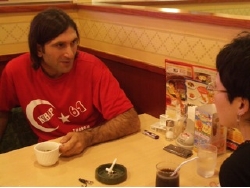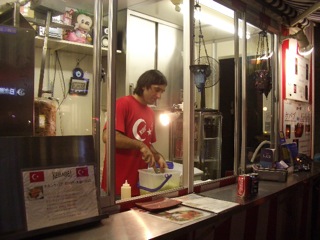September 5 (Sat), 2009
#27 Selami Kucuk
Kebab stall co-owner
(He's been in Japan since 2003)

"You can't clap with one hand" So I need others help. I want to expand our business with good people.
I introduce you to a Turkish guy who runs a kebab stall in Chiba, a suburb area of Tokyo. His name is Selami Kucuk and his background is unique.
He used to be a professional soccer player in his country! Turkey is one of the world-class soccer powers and it placed third in the 2002 FIFA World Cup.
But now a former professional soccer player is making doner kebab everyday in Japan, outside Tokyo. Do you want to know why?
*Interview at a restaurant near stall (Chiba)
*A story of his stall "Kebab61"... Click here and read.
Compiled by Chinatsu Suzuki, Isao Tokuhashi
Almost glorious.
Our stall "Kebab61" is the shop which my younger brother (Vedat Kucuk, a stall owner) opened in 2007. I joined him in January 2009. Before that, I did various kinds of jobs including working at a kebab shop. But I used to be a professional soccer player before coming to Japan. I guess people in Turkey don't know that I'm working at a kebab stall now.
I had played soccer since I was 11. Every child plays soccer in Turkey. My school grades were bad besides physical education. So I decided to be a professional athlete. Then I left junior high school at 12 and joined an amateur soccer team.
A professional team wanted me when I was a mid-teen. But my team didn't want me to leave because I was a really good player enough to secure a regular position among adults.
When I was 17, I got 41 goals. We had 12 matches in a year so I got more than three goals every game! I was talented in soccer.
I became a professional player at 18. The contract money was about two million yen (US$20,000). It was not such a large amount but a soccer player is a celebrity in Turkey so we go to luxury restaurants. One celebrity attracts other celebrities so my daily life had dramatically changed.
I played on several teams. Eight years after I became a professional, I was going to have a 100 million yen (US$1 million) contract with a big team.
Bitter setback.
A big Turkish soccer team called "Galatasaray" (*see this page) wanted me. I also wanted to be on it. I was supposed to sign with that team in a couple of months and the contract would have been about US$1 million.
But I got injured while I waited for the contract. Then the contract between me and that team was scrapped. Finally I couldn't return to being a player.
After I got hurt, whiskers stopped growing on my face. That was because of stress. I wondered if I would be able to return to the pitch again. If no, how would I live the rest of my life? I thought it desperately. That was when I was 26.
One of my teammates told me that he would be my chauffeur if I became a great player. But in actual fact, he became a national team player and I couldn't be that. Do you imagine how I felt? He had been my soccer friend and he was chosen as a national team player. Let me repeat myself that he told me that he would be my chauffeur if I became a great player.
I was driven to the depth of despair. I felt like the road ahead looked pitch-dark.
 Interview by Chinatsu Suzuki, Isao Tokuhashi
Interview by Chinatsu Suzuki, Isao Tokuhashi
Journey to a land where nobody knows me.
I quit playing soccer and joined the Turkish armed forces (*Turkey has a conscription system for men). But before that, I looked ahead as I worked in a mine for six months.
My father was working there. His family had engaged in manual labor. I worked there with them because I couldn't work in town. I would be so embarrassed if people saw me working in town. I got injured and left the pitch. Everybody knew that.
I had served on active duty for a year and half. After leaving the army, I came to Japan. My younger brother had already been here. He felt lonely because he had no family here at all.
Nobody knew me here in Japan. I was going to come here after chucking my career so I expected to start a new life. Rather, I couldn't be in my country anymore because I was not able to work there. It was mentally-damaging for me.
Insanely hard days.
I stayed at my brother's house first. I couldn't understand Japanese at all. I didn't even understand English. I only understood Turkish. So I had a really difficult time.
Especially the first two years, to me, were like 10 years. I didn't understand what people told me so I had no idea whether they had good or bad opinions of me. They also didn't understand what I said. I lived with my brother but it was for a short time. We went our separate ways when we hanged out because brothers don't go out together in Turkey. So I was totally alone. I was sitting in a coffee shop and waiting for someone who came from my country. But I hadn't met any Turkish.
In the first two or three years, foreigners feel they are like a fragile flower. If the strong wind blows, every petal falls. Foreigners also become like that. They don't understand the language so they can't talk to people. They miss their families and friends. Some foreigners get sick because of those factors.
I made phone calls to my family in Turkey so many times. I went back and forth between Japan and Turkey about 20 times in the first two or three years. If I didn't go back home at all, I would have gone crazy.
"House" of police.
I had to do something to make a living. So I started to work at a mobile kebab stall in Tokyo. I didn't imagine that I would work at a kebab shop when I arrived in here but it was the easiest job for me being unable to understand any Japanese. Also I loved having delicious food. I am picky about what I eat so I thought that I would be able to make a good one.
I worked very hard and bought a small truck to start my own kitchen-on-wheels. I opened it for a year but police asked me not to sell kebab on the street. Japanese law had toughened.
They took me away to the local police station. I never forget how I felt when I was taken to a "house" of police. I didn't know about Japanese law. Nobody taught me about that. So I had to waste my money on a truck. I bought it at US$26,000 and I received US$6,000 when I sold it. I don't want to say it was a good experience of learning something. I learned about making kebab at the first stall, not at my own one.
After I closed my own stall, I began to work at construction sites. But human relationships among us became strained because of a small thing.
When I took a train with my coworkers, girls waved to me. I think it was a kind of out of politeness to a foreigner. But my coworkers got jealous. It triggered worsened relations between them and I. Close coworkers began to speak bad of me. I was subjected to nasty glances by them. So I had to quit that job. I thought it was really crazy.
Going back to my starting point.
After my Japanese skills improved, I started to work at a sports club in Tokyo. I gave soccer lessons to high-school children and adults, and I taught swimming to kids between 3 to 14 there.
My students of soccer were amateur players or playing for a hobby. But I really wanted to teach soccer to kids who wanted to be professional. I always want to get along with those who have dreams. Having a dream is wonderful. The same thing can be said in business. If you don't have any dream, you can't put up with the hard work and your life would become boring.
It was fun when I taught swimming to little kids. They called me "Kuma-chan" (little bear) because I have much skin hair. They were so adorable. I really love kids even though I have no child yet.
I worked there for a while and started to help my younger brother in January 2009. He had started his own kebab stall "Kebab61" in Chiba, next to Tokyo, in 2007. Before I joined him, he did everything like purchasing materials, preparations of doner kebab, making kebab sandwiches, sales and accounting. It looked terrible so I decided to help him because I had some experience making kebab.
I have been in Japan for only six years but I feel I've lived here for 20 years. I've faced a lot of difficulties in Japan.
But now I feel like Japan is my home. I'm a permanent visa holder now. I've lived honestly. I've never gone in for crime. I decided to survive in Japan no matter what would happen. I refused to lose. I have nothing to do in Turkey. I would be able to make up for setback I suffered only by becoming the president of a big company in Turkey. I thought it must be impossible there so I decided to survive in Japan. Those are the reasons I continued living here.
Regulars are my associates, not customers.
Kebab shops in the middle of Tokyo earn about ¥200,000 (US$2,000) in one day. On the other hand, our shop earns... maybe ¥30,000 - ¥40,000 (US$300 - 400) a day. Our shop is centrally-located but this area is empty on weekdays. This is an old town of Chiba and businesses moved to the new center. But rent fee is cheap so that's OK. We have many regulars and they say our kebab is morish. I'm really happy with that.
I call them "brother". No other shops call customers like that. But I ask them, "Yo bro, why haven't you come here for a week?" And they say, "Sorry, I've been busy." That's like saying hi to each other. They are our "associates" rather than customers. Our shop is a place where friends get together. So now I really enjoy my life.
However, I don't want to keep things as they are. My brother and I want to expand our business by connecting people. Now we're waiting for the right opportunity. We know that we'll be competitive if we open more stalls around here. Our regulars say they shouldn't have eaten at other shops. So we'll keep this up.
Giving chance to the weak.
There are lucky people and unlucky people. But now people, businesses or government cast aside unlucky ones. For example, it is very difficult for people over age 40 to find jobs in Japan. I feel really sorry about that. I think chances have to be given to them, too. The fact remains that they are human beings even if they get older. So I want to give them opportunities to work and make livings.
As the Turkish proverb goes, "You can't clap with one hand". No matter how many times you wave only one hand, you can't make a sound. So we need others' help. We want to expand our business with good people.

What is Japan to you?
Japan is a wonderful country. Everything is clean, a lot of nature. There are beautiful mountains, ocean and beaches. The government takes care of its natural environment very much.
But I feel sad about this country. For example, teachers have to teach students not only subjects but also cherishing their families including grandparents. Children spend a lot of time at school in Japan so teachers have to teach them to care for the elderly.
Japanese young people forget to keep their adoration. You have to give love not only to your parents or brothers but also to everyone.
All people in the world are the same human beings.
Selami's Link
Kebab61 (English): http://kebab61.com/
A story of his stall "Kebab61"... Click here and read.

 Previous
Previous